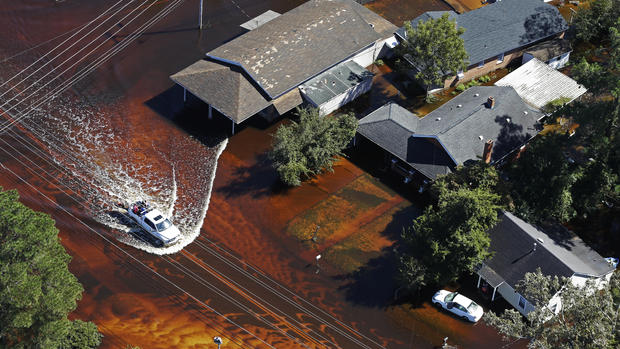Matthew beat up small businesses – insurers may, too
Hurricane Matthew is done battering the Florida, Georgia and North and South Carolina coastlines, but the bruising it inflicted on small businesses there will hurt for a long time.
People will pay more for simple things, like getting a cup of coffee, as you drive an extra 10 minutes because the local luncheonette can’t reopen. The garage where you get the car fixed could be gone forever. And the contractor you hoped would repair your roof may go bankrupt and leave town.
Just how much Hurricane Matthew, which sustained gale-force winds from Florida to North Carolina and dumped up to 18 inches of rain on unlucky Wilmington, North Carolina, will hurt the Southeast coast is anyone’s guess -- until the insurance claims file in. The total estimate of CoreLogic is up to $6 billion, and the Irvine, California, analytics firm expects commercial outfits to take 25 percent of that loss.
The Federal Emergency Management Agency (FEMA) estimates that 40 percent of all small businesses don’t reopen after a flood. And another statistic, which insurers usually mention, is that a quarter of all businesses struck by disaster go under within a year. The figures’ accuracy couldn’t be confirmed because FEMA officials couldn’t be reached for comment and representatives for the insurance industry declined to immediately comment.
“But it’s clear those losses will be extensive,” said attorney Marshall Gilinsky who’s with the Insurance Recovery Group at the law firm of Anderson Kill. Gilinsky has represented commercial policyholders in their claims against insurance companies for 20 years.
“We always hear insurance executives on the news assuring the public that they will take care of things -- that policyholders can rest assured,” said Gilinsky. “But don’t assume everything’s going to be taken care of automatically. Storm-related claims can run into a snarl of unclear policy provisions, exclusions and occasionally obstreperous insurance company adjusters.”
While most business owners focus on the immediate damage to their property, they have several other losses to tally up before submitting an insurance claim:
Business interruption insurance covers companies for losses stemming from unavoidable interruptions to daily operations. This coverage may be triggered by a forced shutdown, a downturn in business due to damage to premises or an impairment in access to a business’s facility, such as downed trees in the parking lot.
The business itself may not have to close, but it could face contingent business interruption. This coverage is triggered when policyholders themselves don’t suffer physical damage but still lose revenue because a property loss sidelines a major supplier or its customer base.
For example, a biker festival in Florida may have to be canceled because it takes place along coastal road A1A, which was damaged and shut down. “This is a standard provision in many property insurance policies, though many small businesses aren’t aware of it,” said Gilinsky.
Business owners may also benefit from coverage for evacuation by order of civil authority, which was triggered when the governors of these coastal states told 2 million people to leave coastal areas. A declaration by state government takes most of the guesswork out of whether a claim is legitimate.
Another part of the policy you should read carefully concerns sublimits for losses caused by “flood,” “storm surge” and “named storms.” How your policy defines these key terms can be critical in determining the amount recoverable for a loss. This was a hotly contested issue in the wake of Superstorm Sandy, which never made landfall as a hurricane.
There can be a big difference between flooding, which often occurs when a stream overflows, and storm surge, which is water that’s forced into a building by rain or tide.
After Hurricane Katrina in 2005, many homeowners and businesses were told that they couldn’t collect because flooding had swept away their buildings, not the wind.
But Gilinsky said courts generally side with policyholders where there’s doubt about what caused the damage, and a denial by your insurer “should in many cases be contested.”
If you’re in doubt about how much you’re entitled to, you might want to hire a public adjuster to calculate the damages. As an attorney, Gilinsky admits that lawyers are expensive and may even be counterproductive when dealing with an insurer.
“Hiring a lawyer tends to make the insurance company hire a lawyer,” he said. “A public adjuster is the first person you want to call to put together the claim. If the insurance company isn’t paying what it owes, then it might be a good idea to seek help from a lawyer.”
